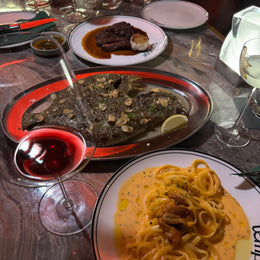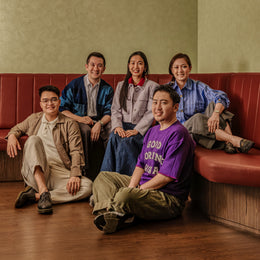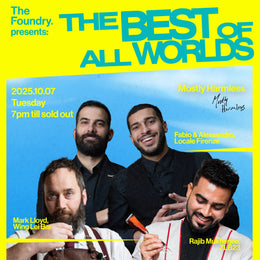Joshua writes about his latest trip to Kagawa, Japan, where he was engaged to craft an elaborate sake pairing dinner and then took the opportunity to discover two hidden gems of sake breweries.
 |
Joshua Kalinan Joshua Kalinan is an acclaimed sake sommelier from Singapore who holds the title Sake Sommelier of the Year 2018 from the Sake Sommelier Association. Joshua educates people about sake through various platforms, and is passionate about finding sake pairings with non-traditional foods such as Indian cuisine. His expertise extends to wine, and he has served as an in-flight sommelier on the Singapore Airlines for 30 years. Follow Joshua on Instagram or his website. |
I received an interesting invitation from SCI (Sake Club India) asking if I could fly to Kagawa, curate the sake and do a pairing dinner at a famous Italian restaurant, Mikayla, at the Sun Port of Kagawa. This was for EO APAC bridge, a group of 50 business people from around the world travelling from Tokyo and on the way to Kagawa. The organizer did not have any idea of which sakes to use and from which suppliers to source them. I decided to fly in earlier on 20 March. The actual event was on 22 March. I was fortunate to have some sake contacts living in Tokushima and willing to drive from Tokushima to Kagawa to assist me in bringing me to the largest sake retail shop in Kagawa. They had a large range of sake. I do not know the Italian menu in the first place and through my experience in sake pairing, I chose sakes that reflect the region.


For example, in Kagawa, the specialty in their sake is the use of Sanuki yeast (olive yeast). Kagawa has less than 6 sake breweries. I selected six types of sake that could go well with Italian cuisine. They were as follows:–
- Ayakiku Junmai Sanuki (Kagawa)
- Ayakiku AWA Sparkling sake (Kagawa)
- Bifoju Junmai Ginjo Tama (Kochi)
- Kidoizumi AFS Nature Barrel aged 480 days aged Koshu (Chiba)
- Chochin Shuzo Namazake (Aichi)
- Kirinzan Umeshu (Niigata)

I started by sharing the histories of sake, explaining rice polishing ratios, types of water used to make sakes, Koji and the yeast. Thereafter I spoke about the first sake, its history, the stories behind them and how they can be paired with the Italian food that they will be having and so forth.

Throughout my session, they was a lot of Q&A from the curious audience which I am so glad to impact my knowledge. Moreso, they were in Japan and keen to purchase sake to bring back home to their home countries to enjoy. I also took the opportunity to interact with the guest and gauge their interest in sake too. There were also Japanese guests amongst the group too. It was definitely an interesting project that I undertook having to source the sakes from an unknown place and bring smiles to the diners with my sake knowledge.

I also had the opportunity to visit one of the four sake breweries that uses Sanuki yeast in their sake. For your information, sake can be made with ambient yeast, wine yeast, sake yeast, olive yeast and flower yeast. The brewery was Ayakiku Shuzo which was more accessible than other sake breweries plus I used two of their sakes for my sake pairing with the Italian restaurant. This brewery was established in 1790. When I reached their it was around 4 pm and they have done their brewing for the day. The CEO was very eager to show me the brewery and its equipment. He even showed me the sacred water source that is used for making sake too. After touring, I tasted all their sake and felt that it was indeed an aromatic style of sake and I was captivated by the aromas and taste of these sake that use olive yeast.

As Kagawa was near to Okayama and with a good Japanese friend who is also a sake enthusiast living in Okayama and that He knew I was coming to Kagawa, was so thrilled that he organized a packed day schedule for me. He picked me up at the train station and drove me to Marumoto Shuzo. It was actually on Saturday and the President, Mr. Marumoto was waiting for us at the sake brewery. He was so passionate about his sake and we asked a lot of questions. His sake brewery is nestled in a nature reserve and his brewery also grow the signature Yamadanishiki rice and even the organic type of Yamadanishiki too. He too, brought us inside the brewery and we did some stirring of the Moromi tank just to get a feel of it. At the end of the tour, I tasted all their sakes that come under the “Chikurin” label.

I was very fortunate that despite my tight schedule in both Kagawa and Okayama Prefectures, I had the chance to visit two sake breweries and even got a hands-on bizenware-making experience at the famous Bizenyaki Store. I managed to make one Katakuchi and one big Guinomi using bizen clay and was told they will fire the kiln in April and will bake my bizenware. Lastly, I was told that the two sake bizenware are ready and will be shipped in due time to my home and I am eagerly waiting to use them for my personal tasting.








